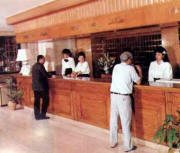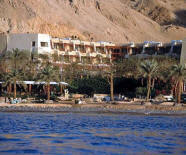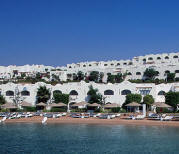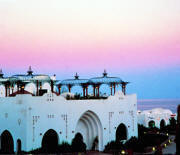|
Egypt Find a premier Hotel & Resort at
Hilton Hotels.
or book
Sheraton Hotels and Resorts
Hotel Pharaoh Egypt - Cairo
STARTING @ $ 60
3 Reviews
 |
Tobya Boutique Hotel TABA EGYPT
a family-run property |
Domina Coral Bay King's Lake
Sharm El Sheikh
 |
Hotel Domina Coral Bay Oasis
Sharm El Sheikh |
|
 |
 |
 |
 |
|
|
The Arab Republic of Egypt, commonly known as Egypt,
(in Arabic: مصر, romanized Misr, in Egyptian Arabic Másr,
listen (help·info)), is a republic in North Africa. While
most of the country is geographically located in Africa, the
Sinai Peninsula east of the Suez Canal is in Asia.
Alexandria
Cairo
Port Said
Covering an area of about 1,001,450 square kilometres
(386,560 mi²), Egypt shares land borders with Libya to the
west, Sudan to the south, and Israel and the Gaza Strip to
the northeast and has coasts on the north and east by the
Mediterranean Sea and the Red Sea, respectively.
Egypt is the fifteenth most populous country in the world.
The vast majority of its 77 million population (2005) live
near the banks of the Nile River (about 40,000 km² or 15,450
mi²), where the only arable agricultural land is found.
Large areas of land are part of the Sahara Desert and are
sparsely inhabited. About half of the Egyptian people today
are urban, living in the densely populated centers of
greater Cairo, the largest city in Africa, and Alexandria.
Egypt is famous for its ancient civilization and some of the
world's most stunning ancient monuments, including the Giza
Pyramids, the Karnak Temple and the Valley of the Kings and
the Great Sphinx; the southern city of Luxor contains a
particularly large number of ancient artifacts. Today, Egypt
is widely regarded as the main political and cultural centre
of the Arab and Middle
Origin and history of the name
Misr, the Arabic and official name for modern Egypt, is of
Semitic origin directly cognate with the Hebrew מִצְרַיִם
Mitzráyim meaning "the two straits", and possibly means "a
country" or "a state." The ancient name for the country,
kemet, or "black land," is derived from the fertile black
soils deposited by the Nile floods, distinct from the 'red
land' (deshret) of the desert. This name became keme in a
later stage of Coptic. The English name "Egypt" came via the
Latin word Aegyptus derived from the ancient Greek word
Αίγυπτος Aiguptos (see also List of traditional Greek place
names). This word may in turn be derived from the ancient
Egyptian phrase ḥwt-k3-ptḥ ("Hwt ka Ptah") meaning "home of
the Ka (part of the soul) of Ptah," the name of a temple of
the god Ptah at Memphis. For details see the article Copt.
History
Main articles: History of Egypt and Ancient Egypt
The Great Sphinx of Giza, with the Pyramid of Khafre in the
background are at the heart of Egypt's thriving tourism
industry.The regularity and richness of the annual Nile
River flood, coupled with semi-isolation provided by deserts
to the east and west, allowed for the development of one of
the world's great civilizations. A unified kingdom was
founded circa 3200 BC by King Narmer, and a series of
dynasties ruled in Egypt for the next three millennia. The
last native dynasty, known as the Thirtieth Dynasty, fell to
the Persians in 341 BC who dug the predecessor of the Suez
canal and connected the Red Sea to the Mediterranean. Later,
Egypt fell to the Greeks, Romans, Byzantines and Persians
again.
It was the Muslim Arabs who introduced Islam and the Arabic
language in the seventh century to the Egyptians, who
gradually adopted both. Muslim rulers nominated by the
Islamic Caliphate remained in control of Egypt for the next
six centuries. A local military caste, the Mamluks took
control about 1250 and continued to govern even after the
conquest of Egypt by the Ottoman Turks in 1517.
Following the completion of the Suez Canal in 1869, Egypt
became an important world transportation hub; however, the
country also fell heavily into debt. Ostensibly to protect
its investments, the United Kingdom seized control of
Egypt's government in 1882, but nominal allegiance to the
Ottoman Empire continued until 1914.
Almost fully independent from the UK in 1922, the Egyptian
Parliament drafted and implemented a new constitution in
1923 under the leadership of the popular revolutionary Saad
Zaghlul. Between 1924-1936 there existed a short-lived but
successful attempt to model Egypt's constitutional
government after the European style of government; known as
Egypt's Liberal Experiment. However, in 1952 a military coup
d'état forced King Farouk I, a constitutional monarch, to
abdicate in support of his son King Ahmed Fouad II.
Finally, the Egyptian Republic was declared on 18 June 1953
with General Muhammad Naguib as the first President of the
Republic. After Naguib was also forced to resign in 1954 by
Gamal Abdel Nasser, the real architect of the 1952 movement,
the latter assumed power as President and nationalized the
Suez Canal leading to the 1956 Suez Crisis. Nasser came out
of the war an Arab hero, and Nasserism won widespread
influence in the region though was met with mixed reactions
amongst Egyptians, many of whom had previously been
indifferent to Arab nationalism.
Between 1958 and 1961, Nasser undertook to form a union
between Egypt and Syria known as the United Arab Republic.
This attempt too was met with mixed reactions, and it was
clear that many Egyptians resented finding that the name of
their country, which had endured for thousands of years, was
suddenly eliminated. Three years after the 1967 Six Day War,
in which Egypt lost the Sinai to Israel, Nasser died and was
succeeded by Anwar Sadat, who presented his takeover in
terms of a Corrective Revolution. Sadat switched Egypt's
Cold War allegiance from the Soviet Union to the United
States, expelling Soviet advisors in 1972, and launched the
Infitah economic reform, while violently clamping down on
religious and secular opposition alike. Egypt's name was
also restored.
In 1973, Egypt, along with Syria, launched a surprise attack
on Israel in the October War (known also as the Yom Kippur
War), which, despite not being a complete military success,
was by most accounts a political victory. Both the United
States and the USSR intervened, and a cease-fire was reached
between Egypt and Israel. In 1979, Sadat made peace with
Israel in exchange for the Sinai, a move that sparked
enormous controversy in the Arab world and led to Egypt's
expulsion from the Arab League (it was readmitted in 1989).
Sadat was murdered by a religious fundamentalist in 1981,
and succeeded by Hosni Mubarak.
Economy
Main article: Economy of Egypt
Egyptian countryside, south of Cairo.Egypt's economy depends
mainly on agriculture, media, petroleum exports, and
tourism; there are also more than 5 million Egyptians
working abroad, mainly in Saudi Arabia, the Gulf area like
UAE, and Europe. The United States as well has a large
population of Egyptian immigrants.
The completion of the Aswan High Dam in 1971 and the
resultant Lake Nasser have altered the time-honored place of
the Nile River in the agriculture and ecology of Egypt. A
rapidly-growing population (the largest in the Arab world),
limited arable land, and dependence on the Nile all continue
to overtax resources and stress the economy.
The government has struggled to prepare the economy for the
new millennium through economic reform and massive
investments in communications and physical infrastructure,
much financed from U.S. foreign aid (since 1979, an average
of $2.2 billion per year). Egypt is the third-largest
recipient of such funds from the United States following the
Iraq war. Economic conditions are starting to improve
considerably after a period of stagnation due to the
adoption of more liberal economic policies by the
government, as well as increased revenues from tourism and a
booming stock market. In its annual report, the IMF has
rated Egypt as one of the top countries in the world
undertaking economic
Demographics
Main article: Demographics of Egypt
Egypt is the second most populous country in Africa, at
about 77,500,000 people. Nearly all the population is
concentrated along the banks of the Nile, notably Alexandria
and Cairo, and in the Delta and near the Suez Canal.
Approximately 94% of the population adheres to Islam and
most of the remainder to Christianity (primarily the Coptic
Orthodox denomination).
The Egyptians are a fairly homogeneous people. North African
and Eastern Mediterranean influences are more predominant in
the north, while the south which bears the same influences
is also home to people who are related to Nubians and
Africans further southeast such as Ethiopians. The bulk of
modern Egyptian society still maintains a homogenous genetic
tie to ancient Egyptian society, which has always been rural
and quite populous compared to neighboring countries. The
Egyptian people have spoken only languages from the
Afro-Asiatic family (previously known as Hamito-Semitic)
throughout their history starting with Old Egyptian to
modern Egyptian Arabic.
Ethnic minorities include a small number of Bedouin Arab
nomads in the Sinai and eastern and western deserts, as well
as some Nubians clustered along the Nile in Upper (southern)
Egypt who are estimated to be about 0.8% of the population.
Egypt also hosts some 90,000 refugees and asylum seekers,
made up mostly of 70,000 Palestinian refugees and 20,000
Sudanese refugees. The once-vibrant Jewish community in
Egypt has virtually disappeared, with only a small number
remaining in Egypt and those who visit on religious
occasions. Several important Jewish archeological and
historical sites also remain.
Geography
Main article: Geography of Egypt
Image:EgyptianDesert.JPG
A great part of Egypt's landmass is desert.Egypt is bordered
by Libya on the west, Sudan on the south, and on Israel on
the northeast. Egypt's important role in geopolitics stems
from its strategic position: a transcontinental nation, it
possesses a land bridge (the Isthmus of Suez) between Africa
and Asia, which in turn is traversed by a navigable waterway
(the Suez Canal) that connects the Mediterranean Sea with
the Indian Ocean via the Red Sea.
Towns and cities include Alexandria, one of the great
ancient cities, Aswan, Asyut, Cairo, the modern Egyptian
capital, El-Mahalla El-Kubra, Giza, the site of the Pyramid
of Khufu, Hurghada, Luxor, Kom Ombo, Port Safaga, Port Said,
Sharm el Sheikh, Shubra-El-Khema, Suez, where the Suez Canal
is located, Zagazig, and Al-Minya.
Deserts: Egypt includes parts of the Sahara Desert and of
the Libyan Desert. These deserts were referred to as the
"red land" in ancient Egypt, and they protected the Kingdom
of the Pharaohs from harm.
Oases include: Bahariya Oasis, Dakhleh Oasis, Farafra Oasis,
Kharga Oasis, Siwa Oasis. An oasis is a fertile or green
area in the midst of a desert.
|
|
Location:
|
Northern Africa, bordering the Mediterranean Sea,
between Libya and the Gaza Strip, and the Red Sea
north of Sudan, and includes the Asian Sinai
Peninsula |
|
Background:
|
The regularity and richness of the annual Nile River
flood, coupled with semi-isolation provided by
deserts to the east and west, allowed for the
development of one of the world's great
civilizations. A unified kingdom arose circa 3200
B.C. and a series of dynasties ruled in Egypt for
the next three millennia. The last native dynasty
fell to the Persians in 341 B.C., who in turn were
replaced by the Greeks, Romans, and Byzantines. It
was the Arabs who introduced Islam and the Arabic
language in the 7th century and who ruled for the
next six centuries. A local military caste, the
Mamluks took control about 1250 and continued to
govern after the conquest of Egypt by the Ottoman
Turks in 1517. Following the completion of the Suez
Canal in 1869, Egypt became an important world
transportation hub, but also fell heavily into debt.
Ostensibly to protect its investments, Britain
seized control of Egypt's government in 1882, but
nominal allegiance to the Ottoman Empire continued
until 1914. Partially independent from the UK in
1922, Egypt acquired full sovereignty following
World War II. The completion of the Aswan High Dam
in 1971 and the resultant Lake Nasser have altered
the time-honored place of the Nile River in the
agriculture and ecology of Egypt. A rapidly growing
population (the largest in the Arab world), limited
arable land, and dependence on the Nile all continue
to overtax resources and stress society. The
government has struggled to ready the economy for
the new millennium through economic reform and
massive investment in communications and physical
infrastructure. |
|
Languages:
|
Arabic (official), English and French
widely understood by educated classes |
|
Exchange rates:
|
Egyptian pounds per US dollar - 4.5 (2002), 3.97
(2001), 3.47 (2000), 3.4 (1999), 3.39 (1998)
|
Destination Guides > Africa
& Middle East
|